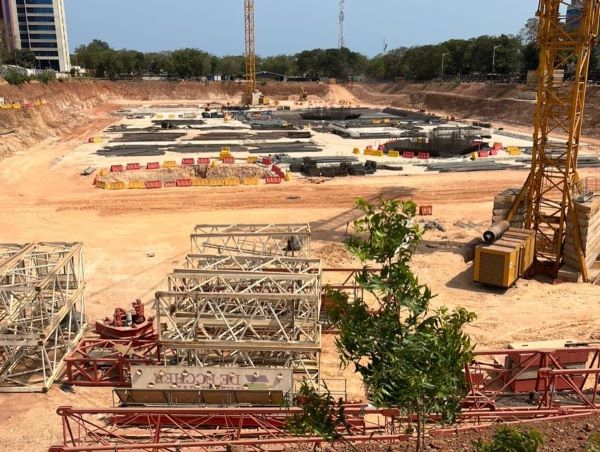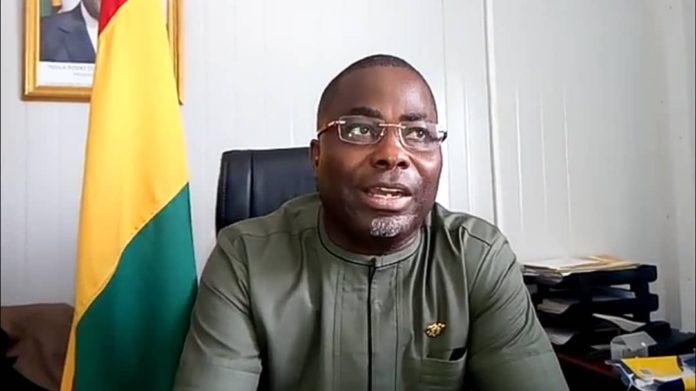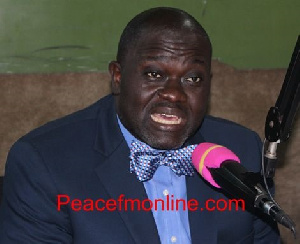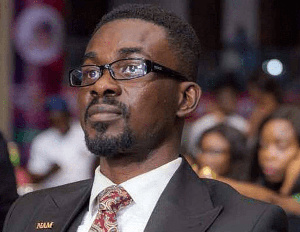Ghana’s National Cathedral features in The New York Times

The controversial National Cathedral project, once envisioned as a grand structure to serve multiple purposes and enhance Ghana’s tourism sector, but now abandoned with little more than a large excavation site, despite $58 million already committed to it in funding — has been featured in one of America’s leading newspapers, The New York Times.
The New York Times feature on the National Cathedral, which pointedly refers to it as an “expensive hole,” chronicles the project’s journey; from its conception by former President Nana Addo Dankwa Akufo-Addo and the high expectations it carried, to the widespread criticisms it attracted and its current abandoned state.
Read the full article of The New York Times May 3, 2025, report on the National Cathedral below:
Ghana Wanted a Cathedral. It Got an ‘Expensive Hole’ Instead
The nation had grand plans for a national cathedral designed by a celebrity architect. The $400 million project became a political battleground.
The walls surrounding Ghana’s national cathedral are aging plywood. Its spires are yellow construction cranes, which have not moved in years. It frequently reverberates with singing — the singing of a choir of frogs that moves in whenever the cathedral’s half-finished foundations fill with rainwater.
Ghana’s former president, Nana Akufo-Addo, spent around $58 million of public money on the $400 million cathedral project — a huge sum in this debt-saddled West African country. The new finance minister said in March that Ghana’s economy was in “severe distress.”
The cathedral was designed by the celebrity architect David Adjaye. But beyond the blueprints, there is very little to show for the money.
“They have only dug a hole — a big hole,” Praise Chinedu, a student and a Pentecostal Christian, said last month.
A well-thumbed Bible tucked under his arm, he was emerging from a morning service at Pure Fire Miracles Ministries onto a street humming with churchgoers, ice cream vendors and clamoring children. His brother John, who had been buying anointing oil, sidled up. “God is not going to be happy,” he said.
Across Accra, Ghana’s coastal capital, citizens joke that the hole is the biggest and most expensive in the world. A valuable stretch of land surrounded by museums, bank headquarters and some of Ghana’s ritziest hotels was cleared of government buildings for the church. That land is now thick with vegetation and bird life, unvisited except by scrap metal thieves and, occasionally in the rainy season, swimmers staging stunts for social media.
The unbuilt cathedral became a symbol of economic mismanagement and a political battleground after Akufo-Addo said that its construction was to fulfill a personal pledge he had made to God.
Now that Akufo-Addo has left office, the project appears permanently doomed.
The cathedral is now a major target of the new government’s anticorruption initiative, called Operation Recover All Loot. Last month, the government announced it would no longer fund the project and dissolved the agency responsible for managing it.
Africa is home to the world’s largest Christian population. Ghana, where faith is especially important to young people, has seen a recent boom in church building.
But the national cathedral project never attracted the support Akufo-Addo anticipated. Instead, construction stalled at its foundations as Ghana suffered its worst economic crisis in a generation.
To many Ghanaians lately, a cathedral has seemed like the last thing the country needs, especially one with an estimated cost of $400 million.
The project began with much fanfare. In 2019, at a fund-raising dinner in Washington, a smiling Akufo-Addo cut into a large gray, square confection — the planned cathedral rendered in cake. With a 5,000-seat auditorium and a concave roof referencing the curve of Asante royal stools, it was intended to be much more than just a cathedral. It was to be a national monument, similar to the Washington National Cathedral or London’s Westminster Abbey. A place where the solemn ceremonies of state — like presidents’ funerals and royal weddings — would take place.
Akufo-Addo, who was born into a Presbyterian family but became an Anglican as a young man, told the group gathered in Washington that the interdenominational cathedral would be a unifier for Ghanaian Christians, who represent more than 70 percent of the population. It would also be an offering of thanks to God for sparing the country from the epidemics, civil wars and famines that had plagued its neighbors, he said.
But then he revealed a third reason for its construction.
“I made a pledge to God that if I become the president — after two unsuccessful attempts — in the 2016 presidential elections, I will build a cathedral to the glory of God,” he said, according to official readouts of the event.
The statement turned out to be a gift to Akufo-Addo’s opponents, who argued that the president should not be allowed to use public money as part of a personal bargain he made with God — let alone $58 million of it.
Paul Opoku-Mensah, the executive director of the agency overseeing the project, said that demonizing the cathedral quickly became “a political strategy.”
In March 2024, one member of Parliament, Samuel Okudzeto Ablakwa, led a march to the construction site, cutting a red ribbon at its gate to poke fun at the president for commissioning what was still a giant hole.
“We are demanding that the contracts must be immediately terminated to avoid further financial loss to the state,” he said.
If using the cathedral to target the president was a political strategy, it worked. John Mahama, a former president who promised to create jobs and fix the economy, pulled off a dramatic comeback in December’s election. He made Okudzeto Ablakwa his foreign minister.
Corruption accusations often take center stage in Ghanaian elections, and the large sums involved in the national cathedral project convinced many Ghanaians that officials had been skimming off the top. A public ombudsman said procurement rules had been breached and recommended a forensic audit.
But in an interview by the big hole in early April, Opoku-Mensah said he had nothing to hide and had handed over all the accounts to the investigators.
He explained that the cathedral was not really intended as a church, but as a major monument that had needed state money to get started but would eventually become a profit-making magnet for visitors.
“It’s a fundamental misunderstanding of the vision,” he said.
Akufo-Addo also seemed befuddled about the controversy. “I find it difficult to see what is so problematic about it,” he said in an interview in April in his book-lined home office surrounded by a lush garden. He mused aloud about whether people believed it “would be too big a tribute to my leadership.”
Now that the country’s leaders have changed, few Ghanaians admit to supporting the cathedral. Those who do say Akufo-Addo and others should foot the bill — but not taxpayers.
“It should be funded through donations,” said Esi Darko, an architect, as she left church one recent afternoon in an Accra neighborhood known as Christian Village. “It shouldn’t be imposed upon everyone because not all are Christians.”
There are also around five million Muslims in Ghana, a country of more than 35 million people, and, lately, a growing number of atheists.
“Don’t believe in God?” reads a billboard in central Accra. “You are not alone.”
Even prominent Christians have soured on the project. Arriving at the church he leads on a recent Sunday, one well-known pastor, Lawrence Tetteh, and his sister Lady Gifty Tetteh, a British Ghanaian barrister, ducked into Tetteh’s office for an interview.
He embraced the cathedral project initially, he said. He thought Christians from different denominations would be brought together by it, just as Ghanaian Muslims are by the national mosque, built by Turkey in 2021. But when he saw so much state money being spent, Tetteh said, he stopped supporting the idea.
“We are a developing nation,” he said. “As much as it’s nice to have an edifice, we also don’t want a situation where our edifice will eat into the little the nation has to live on.”
Tetteh said that God would understand if the president explained that he could not make good on his cathedral promise. “God is not a hard taskmaster,” she said. Perhaps, she suggested, the former president could build him a little prayer room instead.





